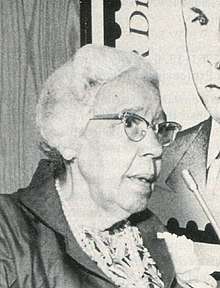Ruth Ella Moore
Ruth Ella Moore (May 19, 1903 in Columbus, Ohio[1] – July 19, 1994) was a bacteriologist, who in 1933 became the first African-American woman to gain a PhD in a natural science.[2] She was a professor and head of the Department of Bacteriology at Howard University, publishing work on tuberculosis, immunology and dental caries, the response of gut microorganisms to antibiotics, and the blood type of African-Americans. During that period she was promoted to associate professor. Though there are gaps in Howard’s personnel records, Moore is believed to have continued to teach and conduct research on bacteriology at Howard until she retired in 1973.
Ruth Ella Moore | |
|---|---|
 Ruth Ella Moore | |
| Born | May 19, 1903 |
| Died | July 19, 1994 |
| Alma mater | |
| Known for |
|
| Scientific career | |
| Institutions | Howard University |
College years
Ruth Ella Moore attended Ohio State University for both of her undergraduate and graduate levels. In 1925, she earned her Bachelor of Science degree, in 1927 her Masters of Science Degree and in 1933 her Ph.D. in Bacteriology.[3] Her dissertation was on the Tuberculosis bacteria and the titles were "Studies on Dissociation of Mycobacterium Tuberculosis" and "A New Method of Concentration on the Tubercule Bacilli as Applied to Sputum And Urine Examination".[4]
Career
During her graduate school years, she taught hygiene and English at Tennessee State College now known as Tennessee State University in Nashville. In 1940, she became assistant Professor of Bacteriology at Howard University College of Medicine. In 1948 she was appointed, and in 1955 she was made Head of the Department of Bacteriology. In 1957, Ruth stepped down from her leadership position but continued to teach and conduct research on bacteriology at Howard University. In 1960, she was appointed associate professor of microbiology. She retired in 1973 while holding position of the associate Professor of emeritus of microbiology until 1990.
While in Howard, she conducted studies on blood groups and enterobacteriacea. Throughout her entire career she was a member of the American Public Health Association and the American Society of Microbiology.[3][5] Moore was the first African-American to join the American Society for Microbiology.[6] Moore was also a member of the American Association of Science, American Society of Immunology, the American Association of Microbiology and the American Public Health Association[7]. Moore retired in 1971.[8]
Moore's publications include a 1938 discussion of the immunology of dental caries,[9] publications in the 1950s on blood types in African-Americans.[10][11] and a 1963 publication on the sensitivity of gut microorganisms to antibiotics.[12]
Honors
She is believed to be the first African-American woman to earn a PhD in the natural sciences.[13][14] She earned two additional honorary degrees. They included a doctorate in Literature from Oberlin College and a Doctor of Philosophy from Gettysburg University in 1973.[15] In 2005, US representative Eddie Bernice Johnson introduced a bill recognizing Ruth Ella Moore as well as other scientists in the United States.[16]
Personal life
Besides being a well known scientist, Ruth Ella Moore was a seamstress. Acquiring the traits from her mother who is a seamstress, Moore dabbled in fashion and loved elegant, classic styles of clothing. Several of Moore's garments were featured in works like The Sewer's Art: Quality, Fashion and Economy in 2009. She constructed garments for all occasions, from day to evening wear, and tailored to draped components.[17] Moore's love for fashion definitely showed in the pieces she wore daily and her love for science also showed in the work she accomplished at Howard University before she unfortunately died in Rockville Maryland at the age of 91 (1994).[1]
See also
References
- "American Society for Microbiology". Retrieved 22 February 2016.
- Warren, Wini (1999). Black women scientists in the United States. Bloomington, Ind. [u.a.]: Indiana University Press. ISBN 978-0253336033.
- "African-American Physicians are key figures in black and medical history". ProQuest 368185306. Cite journal requires
|journal=(help) - "Ruth Ella Moore-Bacteriologist-UCI webfiles". The Faces of Science: African Americans in the Sciences.
- Gross, Victoria (January 13, 2016). "History of Black Scientists: Ruth Ella Moore & James McCune Smith". Communities.
- "Her Story: Ruth Ella Moore". She Made History. 2019-03-27. Retrieved 2020-07-12.
- "Dr. Ruth Ella Moore, the first Black female natural scientist". amsterdamnews.com. Retrieved 2020-07-12.
- Erickson, Tresa (17 February 2003). "African-American women in science". Clarion-Ledger (Jackson, Mississippi). Retrieved 3 April 2017.
- Moore, Ruth E (1938). "Discussion - The Immunology of Dental Caries". The Dentoscope: Journal of the Howard University College of Dentistry. 18 (1): Article 2. Retrieved 3 April 2017.
- Moore, RE (March 1955). "Distribution of blood factors, ABO, MN and Rh in a group of American Negroes". American Journal of Physical Anthropology. 13 (1): 121–8. doi:10.1002/ajpa.1330130109. PMID 14361661.
- MOORE, RE (16 February 1957). "Occurrence of Rh antigen V in a group of American Negroes". Journal of the American Medical Association. 163 (7): 544–5. doi:10.1001/jama.1957.82970420002008a. PMID 13398302.
- Briscoe, M. S.; Moore, Ruth E.; Puckett, Dewey E. (December 1963). "The Sensitivity to Antibiotics of Microorganisms Isolated from the Gut of "Blaberus caniifer" Burmeister". AIBS Bulletin. 13 (6): 27. doi:10.2307/1293031. JSTOR 1293031.
- Jordan, Diann (2007). Sisters in science : conversations with black women scientists about race, gender, and their passion for science. West Lafayette, Ind.: Purdue University Press. ISBN 978-1557534453.
- "Moore, Ruth Ella (1903–1994)". BlackPast.org. 2007-03-12.
- "Black History Month: Ruth Ella Moore | Clothes Lines". u.osu.edu. Retrieved 2019-07-29.
- US Senate and Congress concurrently (2005-04-27). "H.Con.Res.96 — 109th Congress (2005-2006)". U.S. Government Printing Office. Retrieved 28 February 2018.
- "Black History Month: Ruth Ella Moore | Clothes Lines". u.osu.edu. Retrieved 2020-01-31.